Contemporary Hospitality Industry: Types of Business, Operational Departments, and Global Development
VerifiedAdded on 2022/11/25
|13
|3767
|424
AI Summary
This document provides an overview of the contemporary hospitality industry, including the different types of businesses and the products and services they offer. It also explores the operational and functional departments within W London Hotel and their inter-relationships. Additionally, it discusses the contribution of the hospitality industry to the regional, local, and international economy, as well as the influence of licensing and franchising agreements on global development. The document concludes with an assessment of the skills required for various operational roles in the industry and the current skills shortages.
Contribute Materials
Your contribution can guide someone’s learning journey. Share your
documents today.
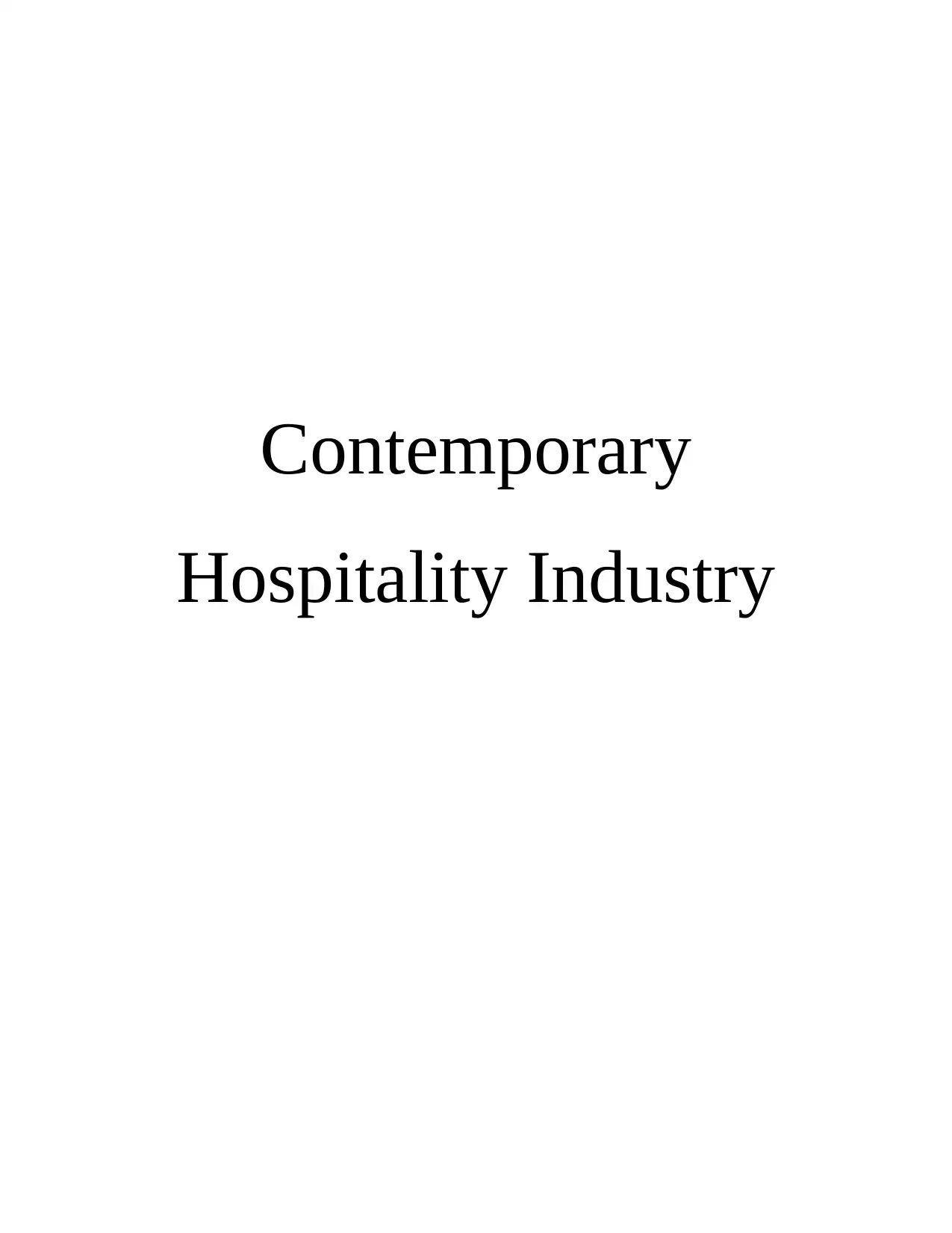
Contemporary
Hospitality Industry
Hospitality Industry
Secure Best Marks with AI Grader
Need help grading? Try our AI Grader for instant feedback on your assignments.
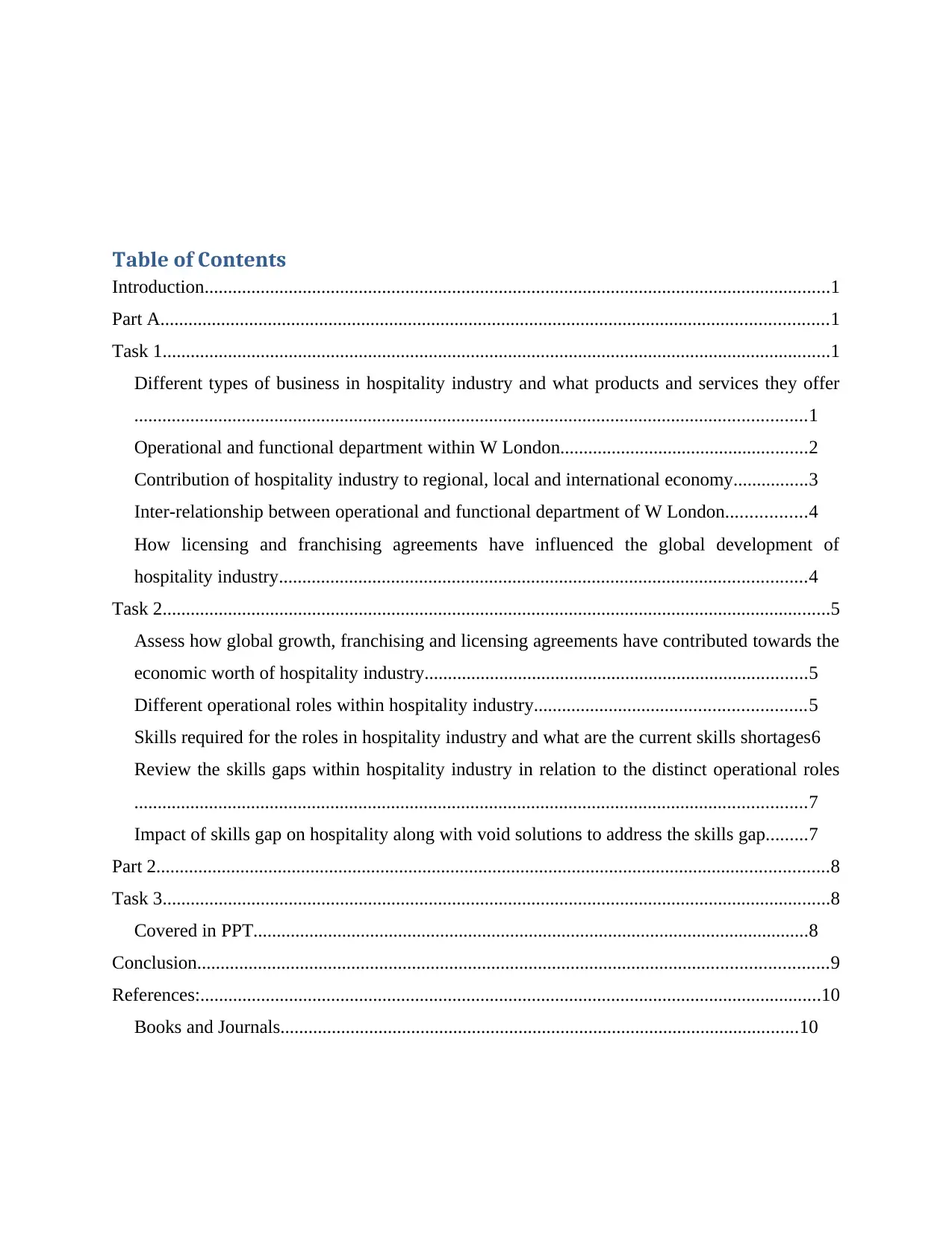
Table of Contents
Introduction......................................................................................................................................1
Part A...............................................................................................................................................1
Task 1...............................................................................................................................................1
Different types of business in hospitality industry and what products and services they offer
................................................................................................................................................1
Operational and functional department within W London.....................................................2
Contribution of hospitality industry to regional, local and international economy................3
Inter-relationship between operational and functional department of W London.................4
How licensing and franchising agreements have influenced the global development of
hospitality industry.................................................................................................................4
Task 2...............................................................................................................................................5
Assess how global growth, franchising and licensing agreements have contributed towards the
economic worth of hospitality industry..................................................................................5
Different operational roles within hospitality industry..........................................................5
Skills required for the roles in hospitality industry and what are the current skills shortages6
Review the skills gaps within hospitality industry in relation to the distinct operational roles
................................................................................................................................................7
Impact of skills gap on hospitality along with void solutions to address the skills gap.........7
Part 2................................................................................................................................................8
Task 3...............................................................................................................................................8
Covered in PPT.......................................................................................................................8
Conclusion.......................................................................................................................................9
References:.....................................................................................................................................10
Books and Journals...............................................................................................................10
Introduction......................................................................................................................................1
Part A...............................................................................................................................................1
Task 1...............................................................................................................................................1
Different types of business in hospitality industry and what products and services they offer
................................................................................................................................................1
Operational and functional department within W London.....................................................2
Contribution of hospitality industry to regional, local and international economy................3
Inter-relationship between operational and functional department of W London.................4
How licensing and franchising agreements have influenced the global development of
hospitality industry.................................................................................................................4
Task 2...............................................................................................................................................5
Assess how global growth, franchising and licensing agreements have contributed towards the
economic worth of hospitality industry..................................................................................5
Different operational roles within hospitality industry..........................................................5
Skills required for the roles in hospitality industry and what are the current skills shortages6
Review the skills gaps within hospitality industry in relation to the distinct operational roles
................................................................................................................................................7
Impact of skills gap on hospitality along with void solutions to address the skills gap.........7
Part 2................................................................................................................................................8
Task 3...............................................................................................................................................8
Covered in PPT.......................................................................................................................8
Conclusion.......................................................................................................................................9
References:.....................................................................................................................................10
Books and Journals...............................................................................................................10
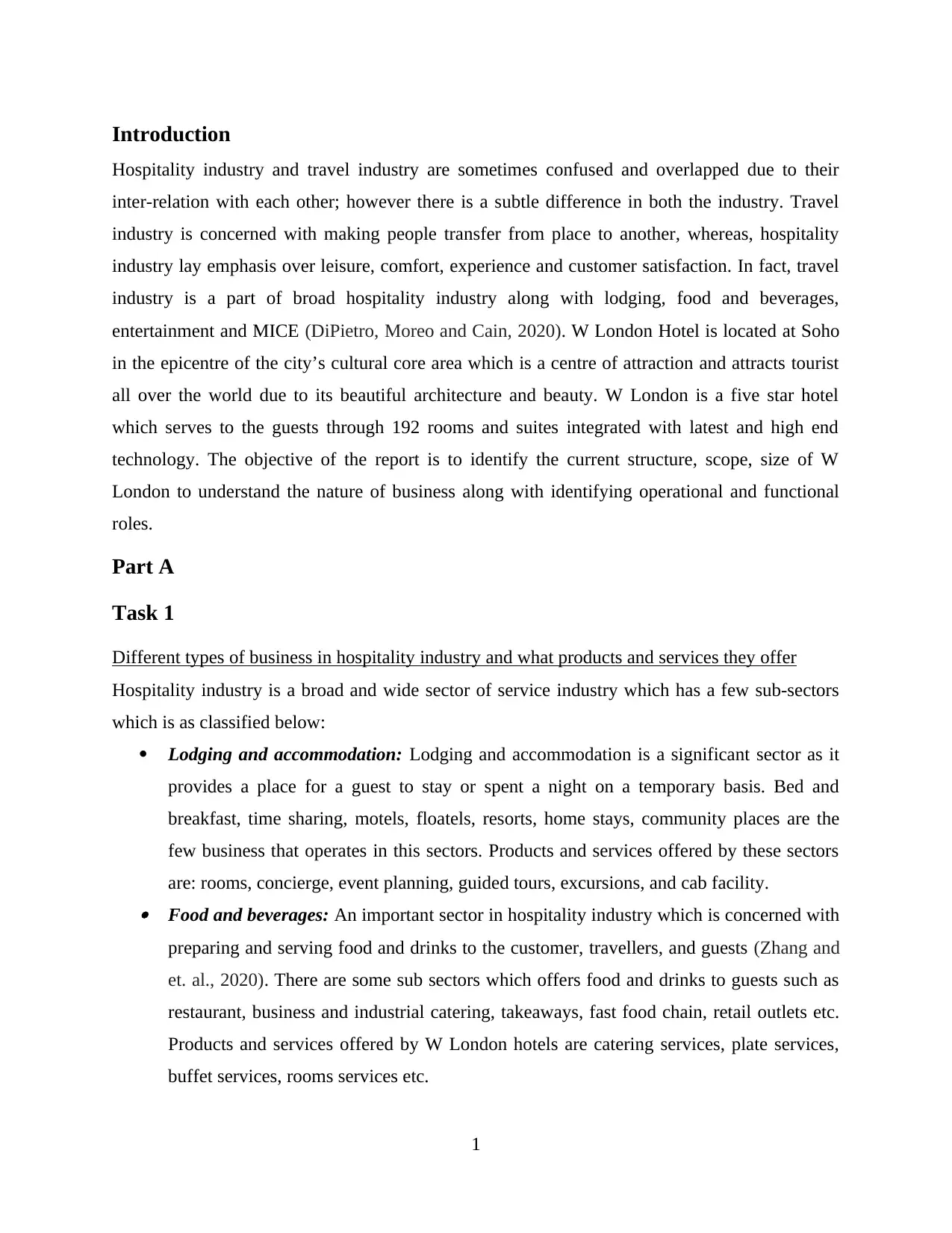
Introduction
Hospitality industry and travel industry are sometimes confused and overlapped due to their
inter-relation with each other; however there is a subtle difference in both the industry. Travel
industry is concerned with making people transfer from place to another, whereas, hospitality
industry lay emphasis over leisure, comfort, experience and customer satisfaction. In fact, travel
industry is a part of broad hospitality industry along with lodging, food and beverages,
entertainment and MICE (DiPietro, Moreo and Cain, 2020). W London Hotel is located at Soho
in the epicentre of the city’s cultural core area which is a centre of attraction and attracts tourist
all over the world due to its beautiful architecture and beauty. W London is a five star hotel
which serves to the guests through 192 rooms and suites integrated with latest and high end
technology. The objective of the report is to identify the current structure, scope, size of W
London to understand the nature of business along with identifying operational and functional
roles.
Part A
Task 1
Different types of business in hospitality industry and what products and services they offer
Hospitality industry is a broad and wide sector of service industry which has a few sub-sectors
which is as classified below:
Lodging and accommodation: Lodging and accommodation is a significant sector as it
provides a place for a guest to stay or spent a night on a temporary basis. Bed and
breakfast, time sharing, motels, floatels, resorts, home stays, community places are the
few business that operates in this sectors. Products and services offered by these sectors
are: rooms, concierge, event planning, guided tours, excursions, and cab facility. Food and beverages: An important sector in hospitality industry which is concerned with
preparing and serving food and drinks to the customer, travellers, and guests (Zhang and
et. al., 2020). There are some sub sectors which offers food and drinks to guests such as
restaurant, business and industrial catering, takeaways, fast food chain, retail outlets etc.
Products and services offered by W London hotels are catering services, plate services,
buffet services, rooms services etc.
1
Hospitality industry and travel industry are sometimes confused and overlapped due to their
inter-relation with each other; however there is a subtle difference in both the industry. Travel
industry is concerned with making people transfer from place to another, whereas, hospitality
industry lay emphasis over leisure, comfort, experience and customer satisfaction. In fact, travel
industry is a part of broad hospitality industry along with lodging, food and beverages,
entertainment and MICE (DiPietro, Moreo and Cain, 2020). W London Hotel is located at Soho
in the epicentre of the city’s cultural core area which is a centre of attraction and attracts tourist
all over the world due to its beautiful architecture and beauty. W London is a five star hotel
which serves to the guests through 192 rooms and suites integrated with latest and high end
technology. The objective of the report is to identify the current structure, scope, size of W
London to understand the nature of business along with identifying operational and functional
roles.
Part A
Task 1
Different types of business in hospitality industry and what products and services they offer
Hospitality industry is a broad and wide sector of service industry which has a few sub-sectors
which is as classified below:
Lodging and accommodation: Lodging and accommodation is a significant sector as it
provides a place for a guest to stay or spent a night on a temporary basis. Bed and
breakfast, time sharing, motels, floatels, resorts, home stays, community places are the
few business that operates in this sectors. Products and services offered by these sectors
are: rooms, concierge, event planning, guided tours, excursions, and cab facility. Food and beverages: An important sector in hospitality industry which is concerned with
preparing and serving food and drinks to the customer, travellers, and guests (Zhang and
et. al., 2020). There are some sub sectors which offers food and drinks to guests such as
restaurant, business and industrial catering, takeaways, fast food chain, retail outlets etc.
Products and services offered by W London hotels are catering services, plate services,
buffet services, rooms services etc.
1
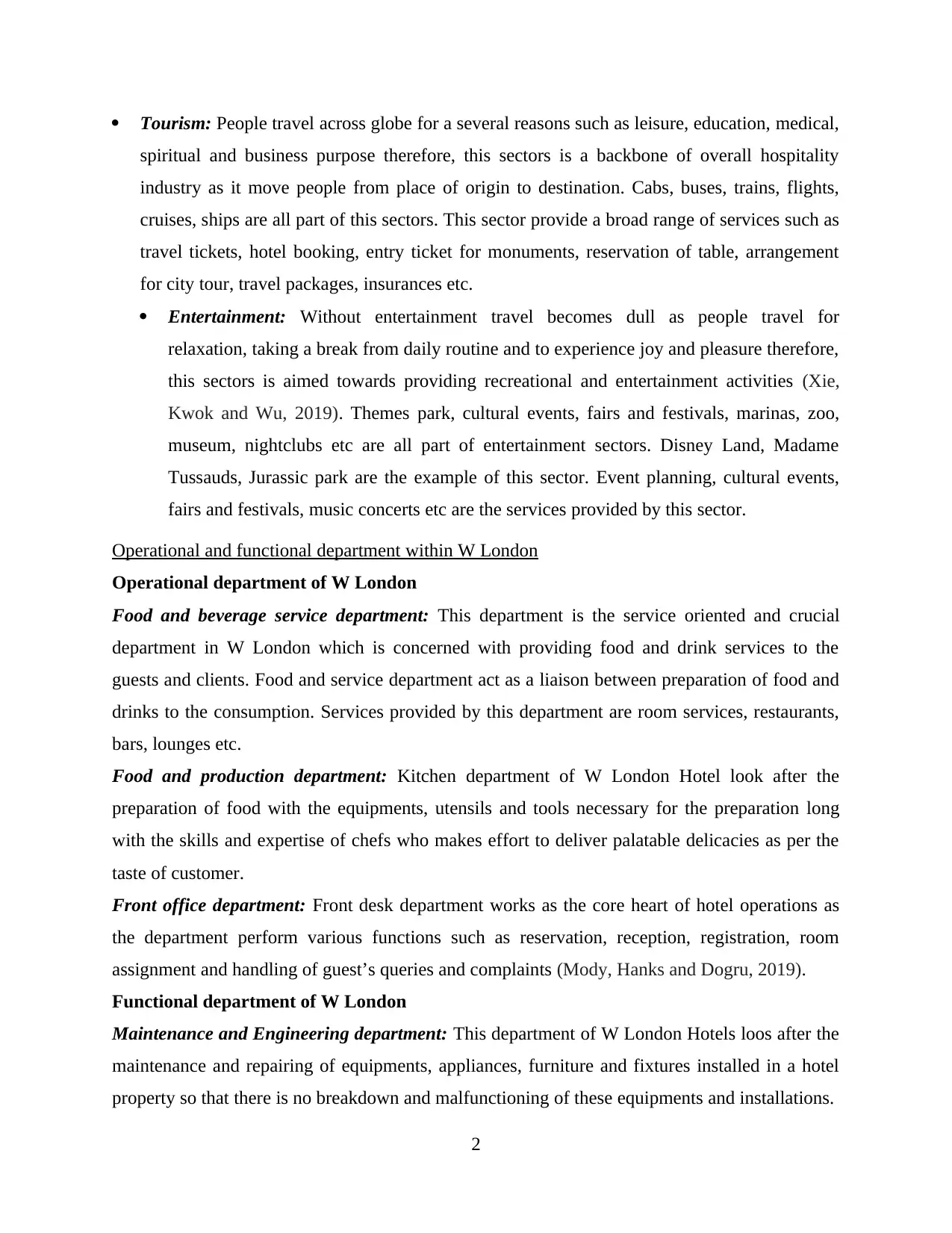
Tourism: People travel across globe for a several reasons such as leisure, education, medical,
spiritual and business purpose therefore, this sectors is a backbone of overall hospitality
industry as it move people from place of origin to destination. Cabs, buses, trains, flights,
cruises, ships are all part of this sectors. This sector provide a broad range of services such as
travel tickets, hotel booking, entry ticket for monuments, reservation of table, arrangement
for city tour, travel packages, insurances etc.
Entertainment: Without entertainment travel becomes dull as people travel for
relaxation, taking a break from daily routine and to experience joy and pleasure therefore,
this sectors is aimed towards providing recreational and entertainment activities (Xie,
Kwok and Wu, 2019). Themes park, cultural events, fairs and festivals, marinas, zoo,
museum, nightclubs etc are all part of entertainment sectors. Disney Land, Madame
Tussauds, Jurassic park are the example of this sector. Event planning, cultural events,
fairs and festivals, music concerts etc are the services provided by this sector.
Operational and functional department within W London
Operational department of W London
Food and beverage service department: This department is the service oriented and crucial
department in W London which is concerned with providing food and drink services to the
guests and clients. Food and service department act as a liaison between preparation of food and
drinks to the consumption. Services provided by this department are room services, restaurants,
bars, lounges etc.
Food and production department: Kitchen department of W London Hotel look after the
preparation of food with the equipments, utensils and tools necessary for the preparation long
with the skills and expertise of chefs who makes effort to deliver palatable delicacies as per the
taste of customer.
Front office department: Front desk department works as the core heart of hotel operations as
the department perform various functions such as reservation, reception, registration, room
assignment and handling of guest’s queries and complaints (Mody, Hanks and Dogru, 2019).
Functional department of W London
Maintenance and Engineering department: This department of W London Hotels loos after the
maintenance and repairing of equipments, appliances, furniture and fixtures installed in a hotel
property so that there is no breakdown and malfunctioning of these equipments and installations.
2
spiritual and business purpose therefore, this sectors is a backbone of overall hospitality
industry as it move people from place of origin to destination. Cabs, buses, trains, flights,
cruises, ships are all part of this sectors. This sector provide a broad range of services such as
travel tickets, hotel booking, entry ticket for monuments, reservation of table, arrangement
for city tour, travel packages, insurances etc.
Entertainment: Without entertainment travel becomes dull as people travel for
relaxation, taking a break from daily routine and to experience joy and pleasure therefore,
this sectors is aimed towards providing recreational and entertainment activities (Xie,
Kwok and Wu, 2019). Themes park, cultural events, fairs and festivals, marinas, zoo,
museum, nightclubs etc are all part of entertainment sectors. Disney Land, Madame
Tussauds, Jurassic park are the example of this sector. Event planning, cultural events,
fairs and festivals, music concerts etc are the services provided by this sector.
Operational and functional department within W London
Operational department of W London
Food and beverage service department: This department is the service oriented and crucial
department in W London which is concerned with providing food and drink services to the
guests and clients. Food and service department act as a liaison between preparation of food and
drinks to the consumption. Services provided by this department are room services, restaurants,
bars, lounges etc.
Food and production department: Kitchen department of W London Hotel look after the
preparation of food with the equipments, utensils and tools necessary for the preparation long
with the skills and expertise of chefs who makes effort to deliver palatable delicacies as per the
taste of customer.
Front office department: Front desk department works as the core heart of hotel operations as
the department perform various functions such as reservation, reception, registration, room
assignment and handling of guest’s queries and complaints (Mody, Hanks and Dogru, 2019).
Functional department of W London
Maintenance and Engineering department: This department of W London Hotels loos after the
maintenance and repairing of equipments, appliances, furniture and fixtures installed in a hotel
property so that there is no breakdown and malfunctioning of these equipments and installations.
2
Secure Best Marks with AI Grader
Need help grading? Try our AI Grader for instant feedback on your assignments.
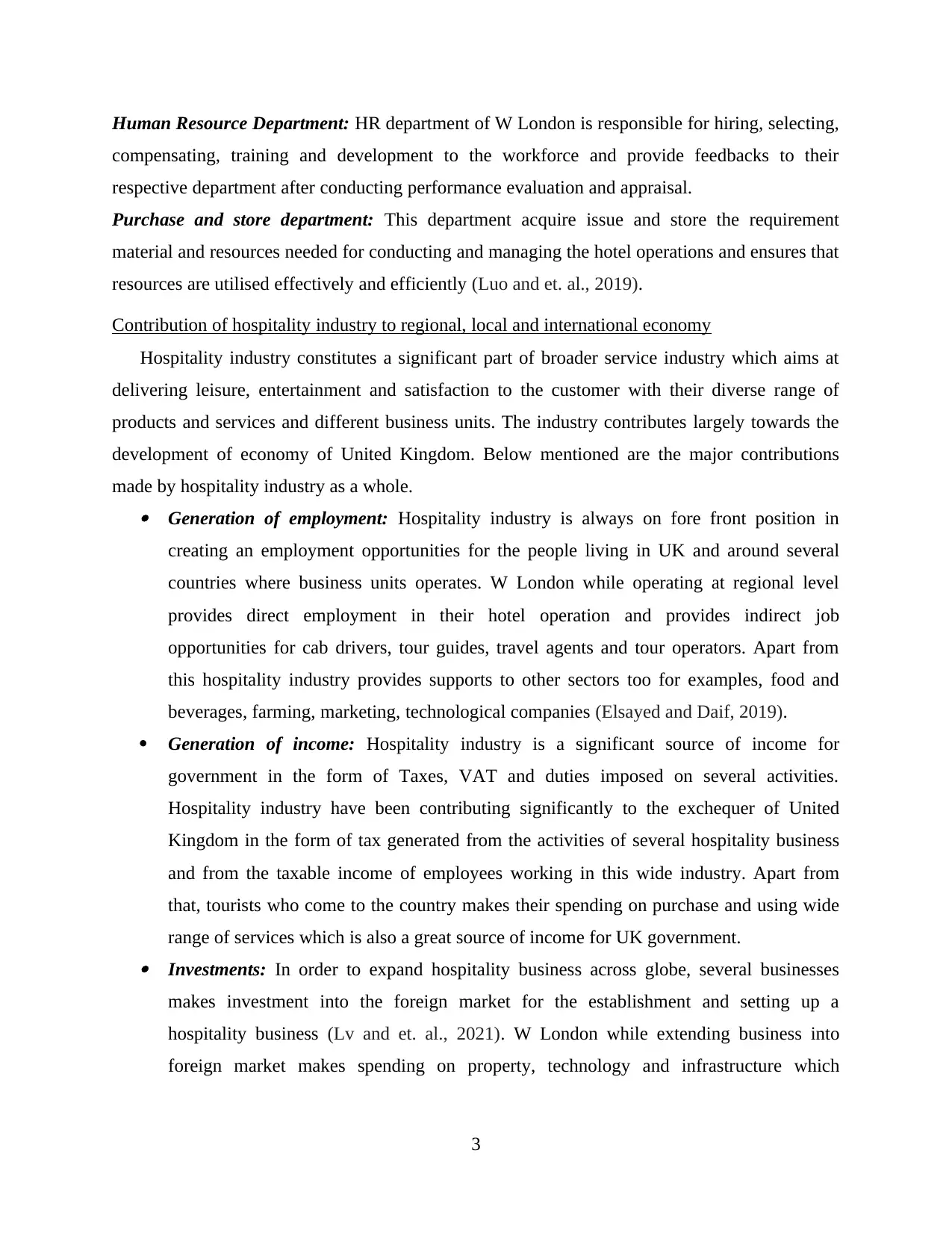
Human Resource Department: HR department of W London is responsible for hiring, selecting,
compensating, training and development to the workforce and provide feedbacks to their
respective department after conducting performance evaluation and appraisal.
Purchase and store department: This department acquire issue and store the requirement
material and resources needed for conducting and managing the hotel operations and ensures that
resources are utilised effectively and efficiently (Luo and et. al., 2019).
Contribution of hospitality industry to regional, local and international economy
Hospitality industry constitutes a significant part of broader service industry which aims at
delivering leisure, entertainment and satisfaction to the customer with their diverse range of
products and services and different business units. The industry contributes largely towards the
development of economy of United Kingdom. Below mentioned are the major contributions
made by hospitality industry as a whole. Generation of employment: Hospitality industry is always on fore front position in
creating an employment opportunities for the people living in UK and around several
countries where business units operates. W London while operating at regional level
provides direct employment in their hotel operation and provides indirect job
opportunities for cab drivers, tour guides, travel agents and tour operators. Apart from
this hospitality industry provides supports to other sectors too for examples, food and
beverages, farming, marketing, technological companies (Elsayed and Daif, 2019).
Generation of income: Hospitality industry is a significant source of income for
government in the form of Taxes, VAT and duties imposed on several activities.
Hospitality industry have been contributing significantly to the exchequer of United
Kingdom in the form of tax generated from the activities of several hospitality business
and from the taxable income of employees working in this wide industry. Apart from
that, tourists who come to the country makes their spending on purchase and using wide
range of services which is also a great source of income for UK government. Investments: In order to expand hospitality business across globe, several businesses
makes investment into the foreign market for the establishment and setting up a
hospitality business (Lv and et. al., 2021). W London while extending business into
foreign market makes spending on property, technology and infrastructure which
3
compensating, training and development to the workforce and provide feedbacks to their
respective department after conducting performance evaluation and appraisal.
Purchase and store department: This department acquire issue and store the requirement
material and resources needed for conducting and managing the hotel operations and ensures that
resources are utilised effectively and efficiently (Luo and et. al., 2019).
Contribution of hospitality industry to regional, local and international economy
Hospitality industry constitutes a significant part of broader service industry which aims at
delivering leisure, entertainment and satisfaction to the customer with their diverse range of
products and services and different business units. The industry contributes largely towards the
development of economy of United Kingdom. Below mentioned are the major contributions
made by hospitality industry as a whole. Generation of employment: Hospitality industry is always on fore front position in
creating an employment opportunities for the people living in UK and around several
countries where business units operates. W London while operating at regional level
provides direct employment in their hotel operation and provides indirect job
opportunities for cab drivers, tour guides, travel agents and tour operators. Apart from
this hospitality industry provides supports to other sectors too for examples, food and
beverages, farming, marketing, technological companies (Elsayed and Daif, 2019).
Generation of income: Hospitality industry is a significant source of income for
government in the form of Taxes, VAT and duties imposed on several activities.
Hospitality industry have been contributing significantly to the exchequer of United
Kingdom in the form of tax generated from the activities of several hospitality business
and from the taxable income of employees working in this wide industry. Apart from
that, tourists who come to the country makes their spending on purchase and using wide
range of services which is also a great source of income for UK government. Investments: In order to expand hospitality business across globe, several businesses
makes investment into the foreign market for the establishment and setting up a
hospitality business (Lv and et. al., 2021). W London while extending business into
foreign market makes spending on property, technology and infrastructure which
3
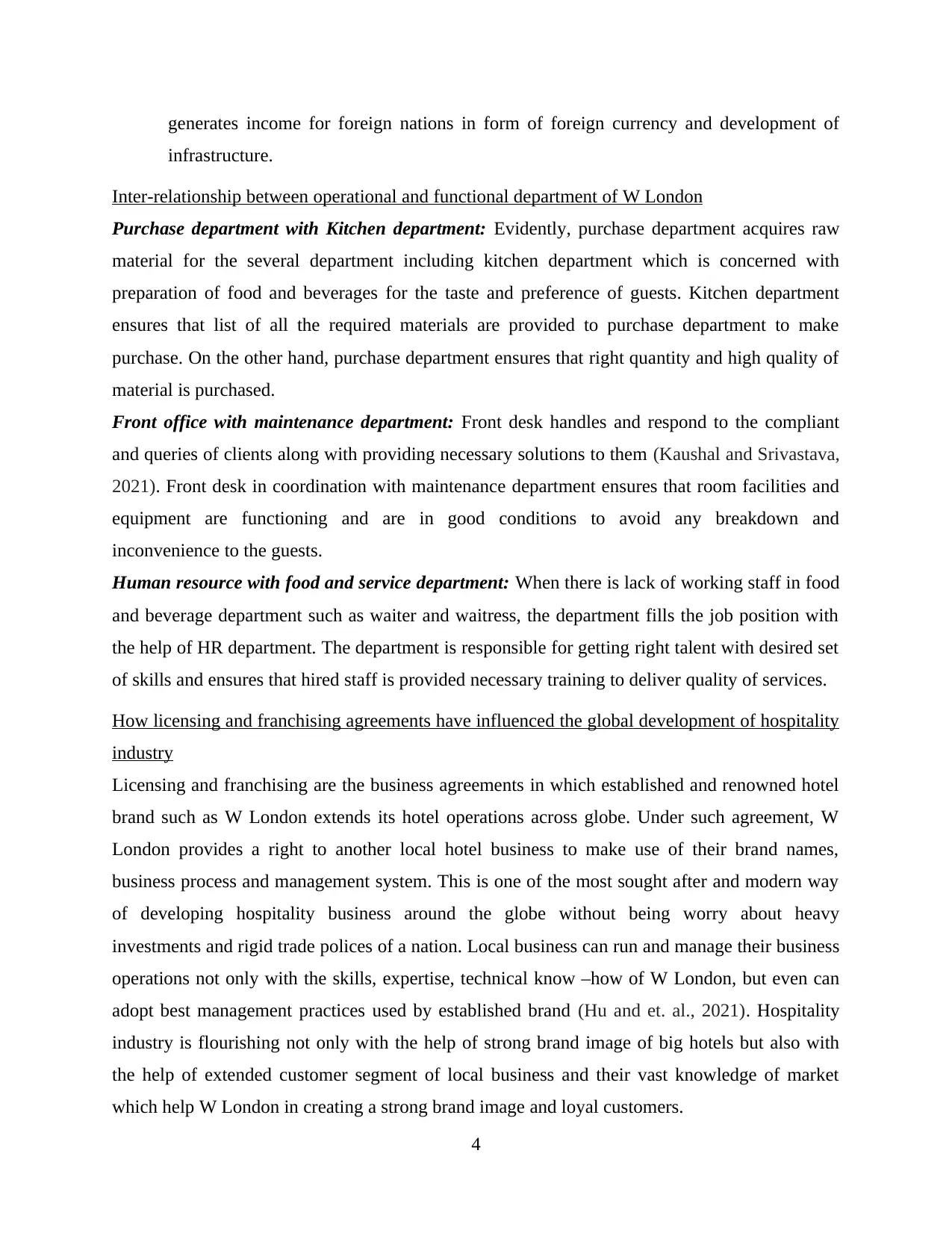
generates income for foreign nations in form of foreign currency and development of
infrastructure.
Inter-relationship between operational and functional department of W London
Purchase department with Kitchen department: Evidently, purchase department acquires raw
material for the several department including kitchen department which is concerned with
preparation of food and beverages for the taste and preference of guests. Kitchen department
ensures that list of all the required materials are provided to purchase department to make
purchase. On the other hand, purchase department ensures that right quantity and high quality of
material is purchased.
Front office with maintenance department: Front desk handles and respond to the compliant
and queries of clients along with providing necessary solutions to them (Kaushal and Srivastava,
2021). Front desk in coordination with maintenance department ensures that room facilities and
equipment are functioning and are in good conditions to avoid any breakdown and
inconvenience to the guests.
Human resource with food and service department: When there is lack of working staff in food
and beverage department such as waiter and waitress, the department fills the job position with
the help of HR department. The department is responsible for getting right talent with desired set
of skills and ensures that hired staff is provided necessary training to deliver quality of services.
How licensing and franchising agreements have influenced the global development of hospitality
industry
Licensing and franchising are the business agreements in which established and renowned hotel
brand such as W London extends its hotel operations across globe. Under such agreement, W
London provides a right to another local hotel business to make use of their brand names,
business process and management system. This is one of the most sought after and modern way
of developing hospitality business around the globe without being worry about heavy
investments and rigid trade polices of a nation. Local business can run and manage their business
operations not only with the skills, expertise, technical know –how of W London, but even can
adopt best management practices used by established brand (Hu and et. al., 2021). Hospitality
industry is flourishing not only with the help of strong brand image of big hotels but also with
the help of extended customer segment of local business and their vast knowledge of market
which help W London in creating a strong brand image and loyal customers.
4
infrastructure.
Inter-relationship between operational and functional department of W London
Purchase department with Kitchen department: Evidently, purchase department acquires raw
material for the several department including kitchen department which is concerned with
preparation of food and beverages for the taste and preference of guests. Kitchen department
ensures that list of all the required materials are provided to purchase department to make
purchase. On the other hand, purchase department ensures that right quantity and high quality of
material is purchased.
Front office with maintenance department: Front desk handles and respond to the compliant
and queries of clients along with providing necessary solutions to them (Kaushal and Srivastava,
2021). Front desk in coordination with maintenance department ensures that room facilities and
equipment are functioning and are in good conditions to avoid any breakdown and
inconvenience to the guests.
Human resource with food and service department: When there is lack of working staff in food
and beverage department such as waiter and waitress, the department fills the job position with
the help of HR department. The department is responsible for getting right talent with desired set
of skills and ensures that hired staff is provided necessary training to deliver quality of services.
How licensing and franchising agreements have influenced the global development of hospitality
industry
Licensing and franchising are the business agreements in which established and renowned hotel
brand such as W London extends its hotel operations across globe. Under such agreement, W
London provides a right to another local hotel business to make use of their brand names,
business process and management system. This is one of the most sought after and modern way
of developing hospitality business around the globe without being worry about heavy
investments and rigid trade polices of a nation. Local business can run and manage their business
operations not only with the skills, expertise, technical know –how of W London, but even can
adopt best management practices used by established brand (Hu and et. al., 2021). Hospitality
industry is flourishing not only with the help of strong brand image of big hotels but also with
the help of extended customer segment of local business and their vast knowledge of market
which help W London in creating a strong brand image and loyal customers.
4
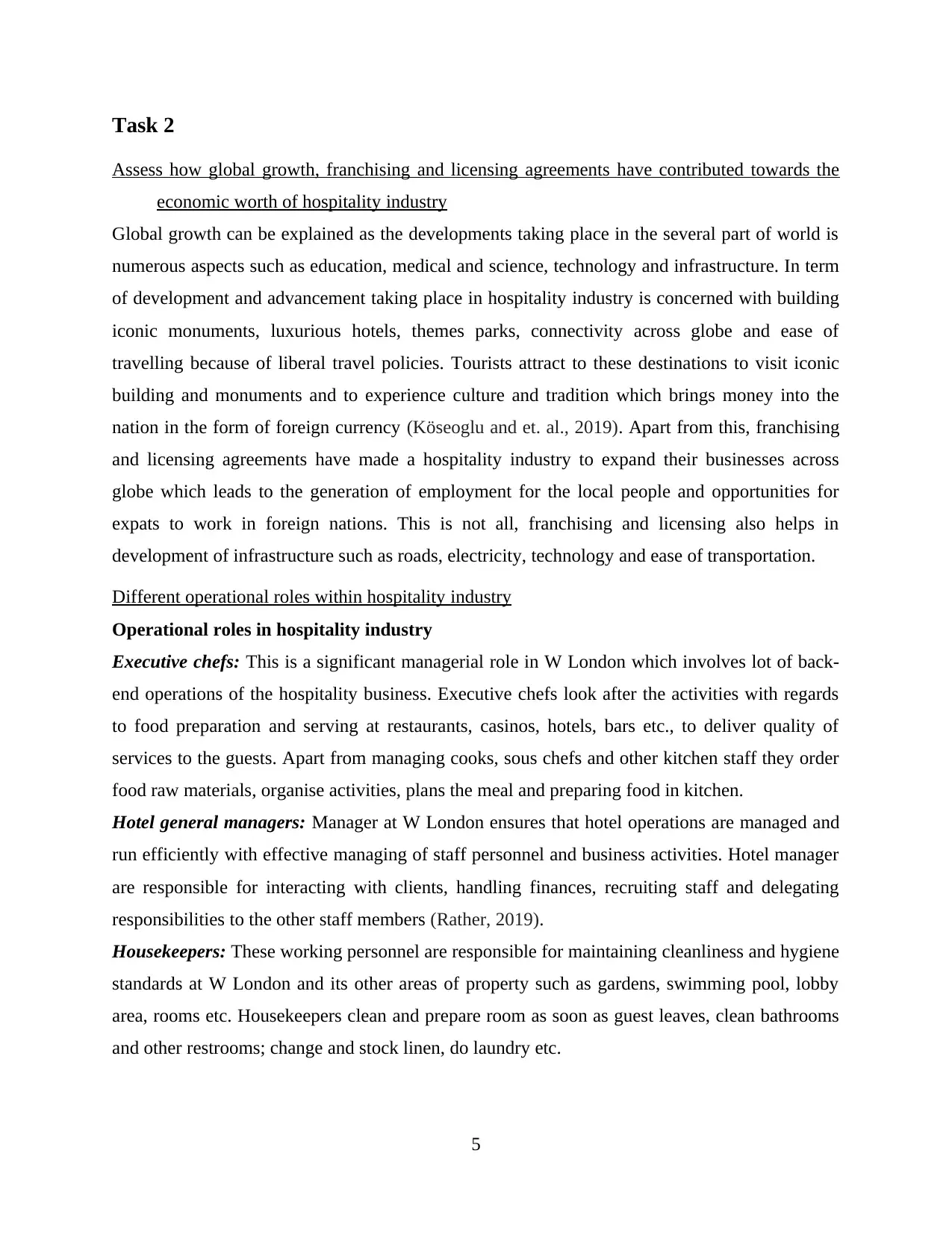
Task 2
Assess how global growth, franchising and licensing agreements have contributed towards the
economic worth of hospitality industry
Global growth can be explained as the developments taking place in the several part of world is
numerous aspects such as education, medical and science, technology and infrastructure. In term
of development and advancement taking place in hospitality industry is concerned with building
iconic monuments, luxurious hotels, themes parks, connectivity across globe and ease of
travelling because of liberal travel policies. Tourists attract to these destinations to visit iconic
building and monuments and to experience culture and tradition which brings money into the
nation in the form of foreign currency (Köseoglu and et. al., 2019). Apart from this, franchising
and licensing agreements have made a hospitality industry to expand their businesses across
globe which leads to the generation of employment for the local people and opportunities for
expats to work in foreign nations. This is not all, franchising and licensing also helps in
development of infrastructure such as roads, electricity, technology and ease of transportation.
Different operational roles within hospitality industry
Operational roles in hospitality industry
Executive chefs: This is a significant managerial role in W London which involves lot of back-
end operations of the hospitality business. Executive chefs look after the activities with regards
to food preparation and serving at restaurants, casinos, hotels, bars etc., to deliver quality of
services to the guests. Apart from managing cooks, sous chefs and other kitchen staff they order
food raw materials, organise activities, plans the meal and preparing food in kitchen.
Hotel general managers: Manager at W London ensures that hotel operations are managed and
run efficiently with effective managing of staff personnel and business activities. Hotel manager
are responsible for interacting with clients, handling finances, recruiting staff and delegating
responsibilities to the other staff members (Rather, 2019).
Housekeepers: These working personnel are responsible for maintaining cleanliness and hygiene
standards at W London and its other areas of property such as gardens, swimming pool, lobby
area, rooms etc. Housekeepers clean and prepare room as soon as guest leaves, clean bathrooms
and other restrooms; change and stock linen, do laundry etc.
5
Assess how global growth, franchising and licensing agreements have contributed towards the
economic worth of hospitality industry
Global growth can be explained as the developments taking place in the several part of world is
numerous aspects such as education, medical and science, technology and infrastructure. In term
of development and advancement taking place in hospitality industry is concerned with building
iconic monuments, luxurious hotels, themes parks, connectivity across globe and ease of
travelling because of liberal travel policies. Tourists attract to these destinations to visit iconic
building and monuments and to experience culture and tradition which brings money into the
nation in the form of foreign currency (Köseoglu and et. al., 2019). Apart from this, franchising
and licensing agreements have made a hospitality industry to expand their businesses across
globe which leads to the generation of employment for the local people and opportunities for
expats to work in foreign nations. This is not all, franchising and licensing also helps in
development of infrastructure such as roads, electricity, technology and ease of transportation.
Different operational roles within hospitality industry
Operational roles in hospitality industry
Executive chefs: This is a significant managerial role in W London which involves lot of back-
end operations of the hospitality business. Executive chefs look after the activities with regards
to food preparation and serving at restaurants, casinos, hotels, bars etc., to deliver quality of
services to the guests. Apart from managing cooks, sous chefs and other kitchen staff they order
food raw materials, organise activities, plans the meal and preparing food in kitchen.
Hotel general managers: Manager at W London ensures that hotel operations are managed and
run efficiently with effective managing of staff personnel and business activities. Hotel manager
are responsible for interacting with clients, handling finances, recruiting staff and delegating
responsibilities to the other staff members (Rather, 2019).
Housekeepers: These working personnel are responsible for maintaining cleanliness and hygiene
standards at W London and its other areas of property such as gardens, swimming pool, lobby
area, rooms etc. Housekeepers clean and prepare room as soon as guest leaves, clean bathrooms
and other restrooms; change and stock linen, do laundry etc.
5
Paraphrase This Document
Need a fresh take? Get an instant paraphrase of this document with our AI Paraphraser
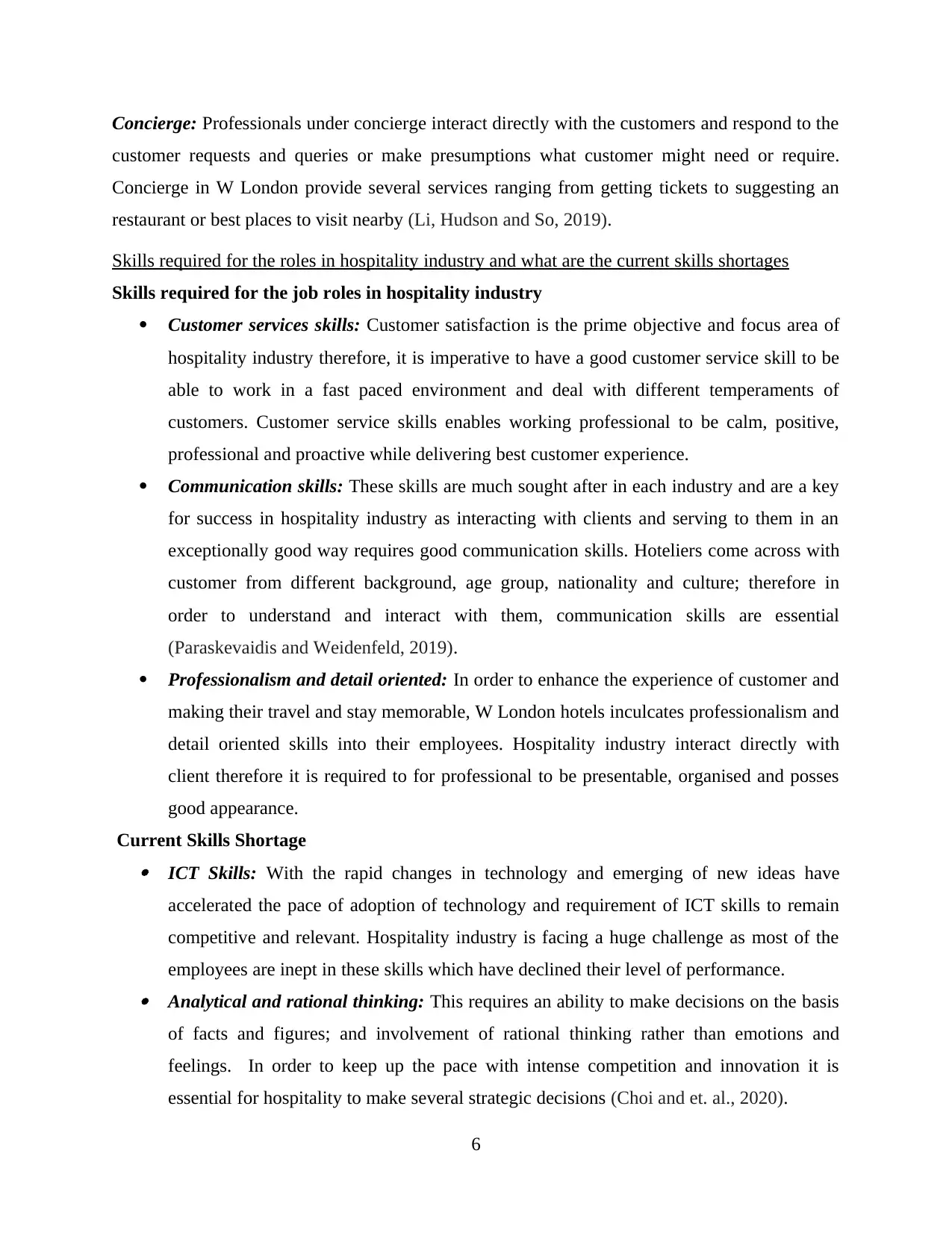
Concierge: Professionals under concierge interact directly with the customers and respond to the
customer requests and queries or make presumptions what customer might need or require.
Concierge in W London provide several services ranging from getting tickets to suggesting an
restaurant or best places to visit nearby (Li, Hudson and So, 2019).
Skills required for the roles in hospitality industry and what are the current skills shortages
Skills required for the job roles in hospitality industry
Customer services skills: Customer satisfaction is the prime objective and focus area of
hospitality industry therefore, it is imperative to have a good customer service skill to be
able to work in a fast paced environment and deal with different temperaments of
customers. Customer service skills enables working professional to be calm, positive,
professional and proactive while delivering best customer experience.
Communication skills: These skills are much sought after in each industry and are a key
for success in hospitality industry as interacting with clients and serving to them in an
exceptionally good way requires good communication skills. Hoteliers come across with
customer from different background, age group, nationality and culture; therefore in
order to understand and interact with them, communication skills are essential
(Paraskevaidis and Weidenfeld, 2019).
Professionalism and detail oriented: In order to enhance the experience of customer and
making their travel and stay memorable, W London hotels inculcates professionalism and
detail oriented skills into their employees. Hospitality industry interact directly with
client therefore it is required to for professional to be presentable, organised and posses
good appearance.
Current Skills Shortage ICT Skills: With the rapid changes in technology and emerging of new ideas have
accelerated the pace of adoption of technology and requirement of ICT skills to remain
competitive and relevant. Hospitality industry is facing a huge challenge as most of the
employees are inept in these skills which have declined their level of performance. Analytical and rational thinking: This requires an ability to make decisions on the basis
of facts and figures; and involvement of rational thinking rather than emotions and
feelings. In order to keep up the pace with intense competition and innovation it is
essential for hospitality to make several strategic decisions (Choi and et. al., 2020).
6
customer requests and queries or make presumptions what customer might need or require.
Concierge in W London provide several services ranging from getting tickets to suggesting an
restaurant or best places to visit nearby (Li, Hudson and So, 2019).
Skills required for the roles in hospitality industry and what are the current skills shortages
Skills required for the job roles in hospitality industry
Customer services skills: Customer satisfaction is the prime objective and focus area of
hospitality industry therefore, it is imperative to have a good customer service skill to be
able to work in a fast paced environment and deal with different temperaments of
customers. Customer service skills enables working professional to be calm, positive,
professional and proactive while delivering best customer experience.
Communication skills: These skills are much sought after in each industry and are a key
for success in hospitality industry as interacting with clients and serving to them in an
exceptionally good way requires good communication skills. Hoteliers come across with
customer from different background, age group, nationality and culture; therefore in
order to understand and interact with them, communication skills are essential
(Paraskevaidis and Weidenfeld, 2019).
Professionalism and detail oriented: In order to enhance the experience of customer and
making their travel and stay memorable, W London hotels inculcates professionalism and
detail oriented skills into their employees. Hospitality industry interact directly with
client therefore it is required to for professional to be presentable, organised and posses
good appearance.
Current Skills Shortage ICT Skills: With the rapid changes in technology and emerging of new ideas have
accelerated the pace of adoption of technology and requirement of ICT skills to remain
competitive and relevant. Hospitality industry is facing a huge challenge as most of the
employees are inept in these skills which have declined their level of performance. Analytical and rational thinking: This requires an ability to make decisions on the basis
of facts and figures; and involvement of rational thinking rather than emotions and
feelings. In order to keep up the pace with intense competition and innovation it is
essential for hospitality to make several strategic decisions (Choi and et. al., 2020).
6
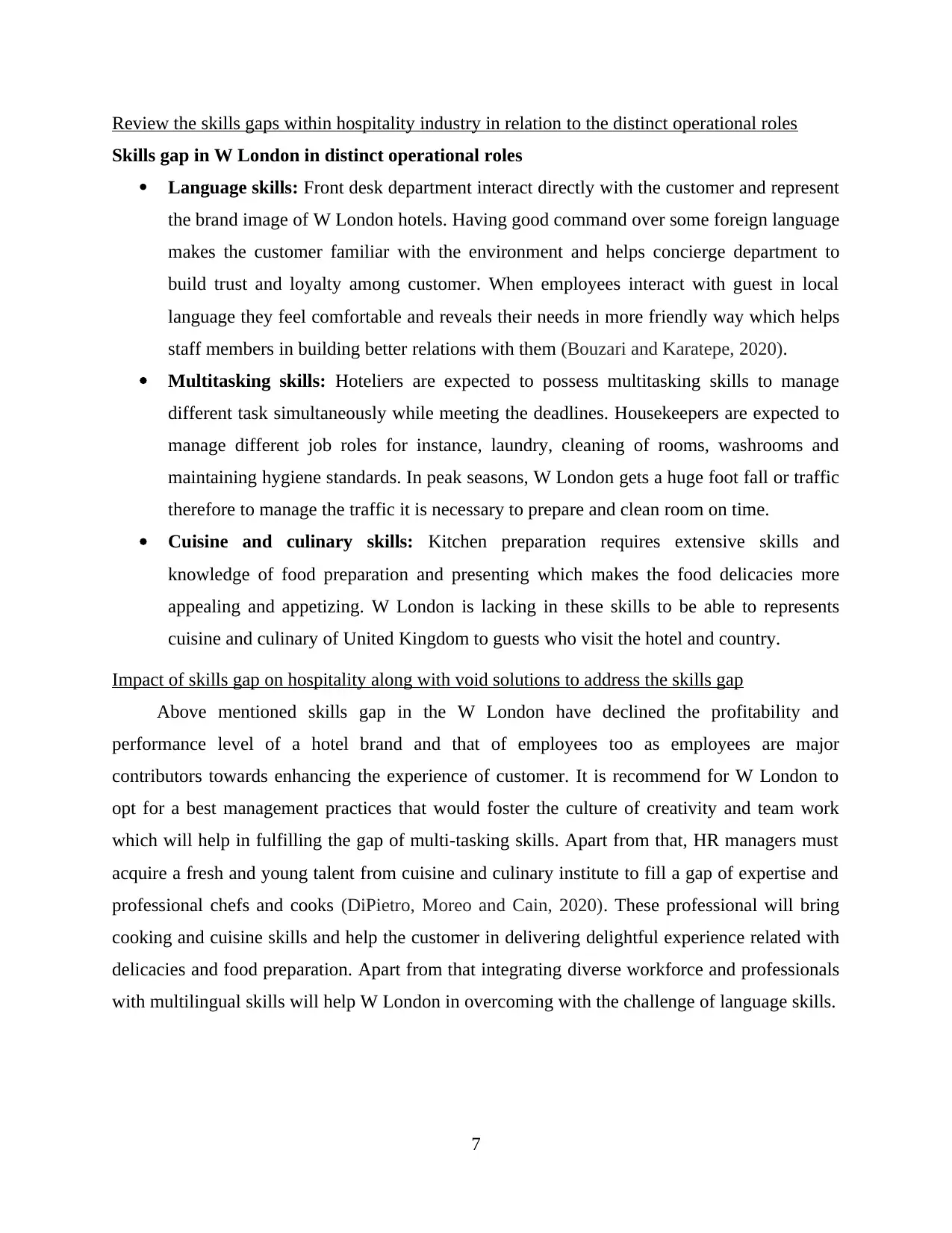
Review the skills gaps within hospitality industry in relation to the distinct operational roles
Skills gap in W London in distinct operational roles
Language skills: Front desk department interact directly with the customer and represent
the brand image of W London hotels. Having good command over some foreign language
makes the customer familiar with the environment and helps concierge department to
build trust and loyalty among customer. When employees interact with guest in local
language they feel comfortable and reveals their needs in more friendly way which helps
staff members in building better relations with them (Bouzari and Karatepe, 2020).
Multitasking skills: Hoteliers are expected to possess multitasking skills to manage
different task simultaneously while meeting the deadlines. Housekeepers are expected to
manage different job roles for instance, laundry, cleaning of rooms, washrooms and
maintaining hygiene standards. In peak seasons, W London gets a huge foot fall or traffic
therefore to manage the traffic it is necessary to prepare and clean room on time.
Cuisine and culinary skills: Kitchen preparation requires extensive skills and
knowledge of food preparation and presenting which makes the food delicacies more
appealing and appetizing. W London is lacking in these skills to be able to represents
cuisine and culinary of United Kingdom to guests who visit the hotel and country.
Impact of skills gap on hospitality along with void solutions to address the skills gap
Above mentioned skills gap in the W London have declined the profitability and
performance level of a hotel brand and that of employees too as employees are major
contributors towards enhancing the experience of customer. It is recommend for W London to
opt for a best management practices that would foster the culture of creativity and team work
which will help in fulfilling the gap of multi-tasking skills. Apart from that, HR managers must
acquire a fresh and young talent from cuisine and culinary institute to fill a gap of expertise and
professional chefs and cooks (DiPietro, Moreo and Cain, 2020). These professional will bring
cooking and cuisine skills and help the customer in delivering delightful experience related with
delicacies and food preparation. Apart from that integrating diverse workforce and professionals
with multilingual skills will help W London in overcoming with the challenge of language skills.
7
Skills gap in W London in distinct operational roles
Language skills: Front desk department interact directly with the customer and represent
the brand image of W London hotels. Having good command over some foreign language
makes the customer familiar with the environment and helps concierge department to
build trust and loyalty among customer. When employees interact with guest in local
language they feel comfortable and reveals their needs in more friendly way which helps
staff members in building better relations with them (Bouzari and Karatepe, 2020).
Multitasking skills: Hoteliers are expected to possess multitasking skills to manage
different task simultaneously while meeting the deadlines. Housekeepers are expected to
manage different job roles for instance, laundry, cleaning of rooms, washrooms and
maintaining hygiene standards. In peak seasons, W London gets a huge foot fall or traffic
therefore to manage the traffic it is necessary to prepare and clean room on time.
Cuisine and culinary skills: Kitchen preparation requires extensive skills and
knowledge of food preparation and presenting which makes the food delicacies more
appealing and appetizing. W London is lacking in these skills to be able to represents
cuisine and culinary of United Kingdom to guests who visit the hotel and country.
Impact of skills gap on hospitality along with void solutions to address the skills gap
Above mentioned skills gap in the W London have declined the profitability and
performance level of a hotel brand and that of employees too as employees are major
contributors towards enhancing the experience of customer. It is recommend for W London to
opt for a best management practices that would foster the culture of creativity and team work
which will help in fulfilling the gap of multi-tasking skills. Apart from that, HR managers must
acquire a fresh and young talent from cuisine and culinary institute to fill a gap of expertise and
professional chefs and cooks (DiPietro, Moreo and Cain, 2020). These professional will bring
cooking and cuisine skills and help the customer in delivering delightful experience related with
delicacies and food preparation. Apart from that integrating diverse workforce and professionals
with multilingual skills will help W London in overcoming with the challenge of language skills.
7

Part 2
Task 3
Covered in PPT
8
Task 3
Covered in PPT
8
Secure Best Marks with AI Grader
Need help grading? Try our AI Grader for instant feedback on your assignments.
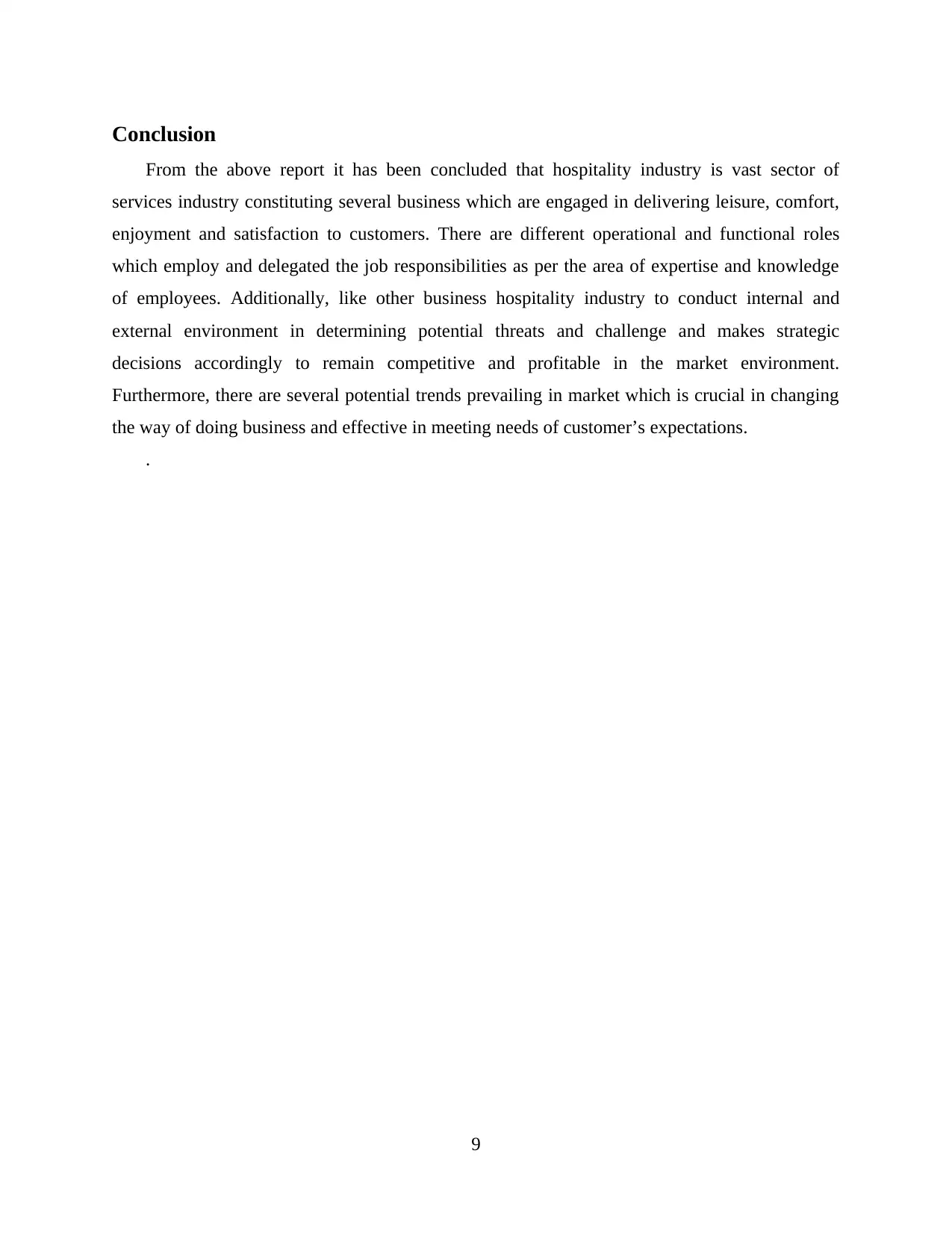
Conclusion
From the above report it has been concluded that hospitality industry is vast sector of
services industry constituting several business which are engaged in delivering leisure, comfort,
enjoyment and satisfaction to customers. There are different operational and functional roles
which employ and delegated the job responsibilities as per the area of expertise and knowledge
of employees. Additionally, like other business hospitality industry to conduct internal and
external environment in determining potential threats and challenge and makes strategic
decisions accordingly to remain competitive and profitable in the market environment.
Furthermore, there are several potential trends prevailing in market which is crucial in changing
the way of doing business and effective in meeting needs of customer’s expectations.
.
9
From the above report it has been concluded that hospitality industry is vast sector of
services industry constituting several business which are engaged in delivering leisure, comfort,
enjoyment and satisfaction to customers. There are different operational and functional roles
which employ and delegated the job responsibilities as per the area of expertise and knowledge
of employees. Additionally, like other business hospitality industry to conduct internal and
external environment in determining potential threats and challenge and makes strategic
decisions accordingly to remain competitive and profitable in the market environment.
Furthermore, there are several potential trends prevailing in market which is crucial in changing
the way of doing business and effective in meeting needs of customer’s expectations.
.
9
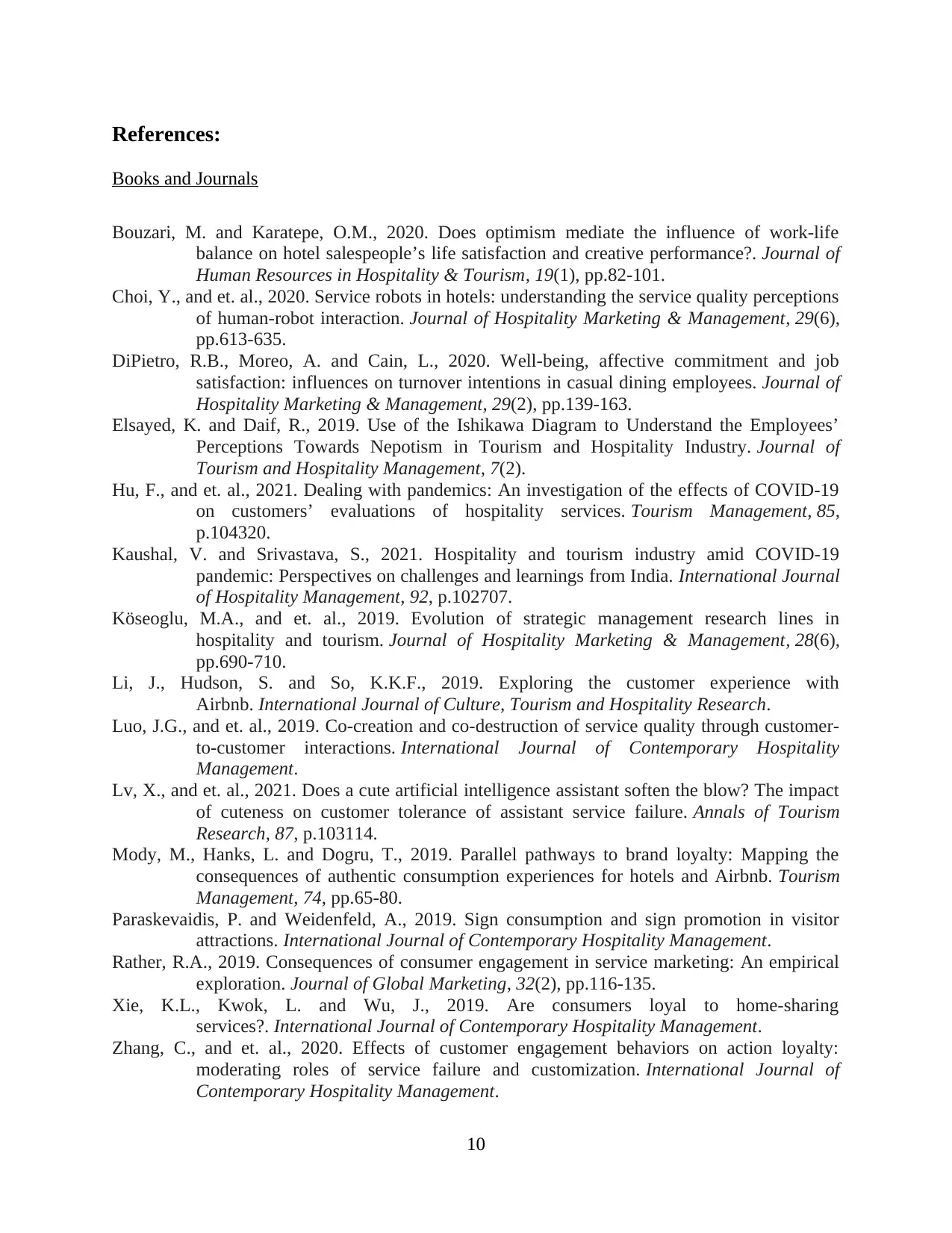
References:
Books and Journals
Bouzari, M. and Karatepe, O.M., 2020. Does optimism mediate the influence of work-life
balance on hotel salespeople’s life satisfaction and creative performance?. Journal of
Human Resources in Hospitality & Tourism, 19(1), pp.82-101.
Choi, Y., and et. al., 2020. Service robots in hotels: understanding the service quality perceptions
of human-robot interaction. Journal of Hospitality Marketing & Management, 29(6),
pp.613-635.
DiPietro, R.B., Moreo, A. and Cain, L., 2020. Well-being, affective commitment and job
satisfaction: influences on turnover intentions in casual dining employees. Journal of
Hospitality Marketing & Management, 29(2), pp.139-163.
Elsayed, K. and Daif, R., 2019. Use of the Ishikawa Diagram to Understand the Employees’
Perceptions Towards Nepotism in Tourism and Hospitality Industry. Journal of
Tourism and Hospitality Management, 7(2).
Hu, F., and et. al., 2021. Dealing with pandemics: An investigation of the effects of COVID-19
on customers’ evaluations of hospitality services. Tourism Management, 85,
p.104320.
Kaushal, V. and Srivastava, S., 2021. Hospitality and tourism industry amid COVID-19
pandemic: Perspectives on challenges and learnings from India. International Journal
of Hospitality Management, 92, p.102707.
Köseoglu, M.A., and et. al., 2019. Evolution of strategic management research lines in
hospitality and tourism. Journal of Hospitality Marketing & Management, 28(6),
pp.690-710.
Li, J., Hudson, S. and So, K.K.F., 2019. Exploring the customer experience with
Airbnb. International Journal of Culture, Tourism and Hospitality Research.
Luo, J.G., and et. al., 2019. Co-creation and co-destruction of service quality through customer-
to-customer interactions. International Journal of Contemporary Hospitality
Management.
Lv, X., and et. al., 2021. Does a cute artificial intelligence assistant soften the blow? The impact
of cuteness on customer tolerance of assistant service failure. Annals of Tourism
Research, 87, p.103114.
Mody, M., Hanks, L. and Dogru, T., 2019. Parallel pathways to brand loyalty: Mapping the
consequences of authentic consumption experiences for hotels and Airbnb. Tourism
Management, 74, pp.65-80.
Paraskevaidis, P. and Weidenfeld, A., 2019. Sign consumption and sign promotion in visitor
attractions. International Journal of Contemporary Hospitality Management.
Rather, R.A., 2019. Consequences of consumer engagement in service marketing: An empirical
exploration. Journal of Global Marketing, 32(2), pp.116-135.
Xie, K.L., Kwok, L. and Wu, J., 2019. Are consumers loyal to home-sharing
services?. International Journal of Contemporary Hospitality Management.
Zhang, C., and et. al., 2020. Effects of customer engagement behaviors on action loyalty:
moderating roles of service failure and customization. International Journal of
Contemporary Hospitality Management.
10
Books and Journals
Bouzari, M. and Karatepe, O.M., 2020. Does optimism mediate the influence of work-life
balance on hotel salespeople’s life satisfaction and creative performance?. Journal of
Human Resources in Hospitality & Tourism, 19(1), pp.82-101.
Choi, Y., and et. al., 2020. Service robots in hotels: understanding the service quality perceptions
of human-robot interaction. Journal of Hospitality Marketing & Management, 29(6),
pp.613-635.
DiPietro, R.B., Moreo, A. and Cain, L., 2020. Well-being, affective commitment and job
satisfaction: influences on turnover intentions in casual dining employees. Journal of
Hospitality Marketing & Management, 29(2), pp.139-163.
Elsayed, K. and Daif, R., 2019. Use of the Ishikawa Diagram to Understand the Employees’
Perceptions Towards Nepotism in Tourism and Hospitality Industry. Journal of
Tourism and Hospitality Management, 7(2).
Hu, F., and et. al., 2021. Dealing with pandemics: An investigation of the effects of COVID-19
on customers’ evaluations of hospitality services. Tourism Management, 85,
p.104320.
Kaushal, V. and Srivastava, S., 2021. Hospitality and tourism industry amid COVID-19
pandemic: Perspectives on challenges and learnings from India. International Journal
of Hospitality Management, 92, p.102707.
Köseoglu, M.A., and et. al., 2019. Evolution of strategic management research lines in
hospitality and tourism. Journal of Hospitality Marketing & Management, 28(6),
pp.690-710.
Li, J., Hudson, S. and So, K.K.F., 2019. Exploring the customer experience with
Airbnb. International Journal of Culture, Tourism and Hospitality Research.
Luo, J.G., and et. al., 2019. Co-creation and co-destruction of service quality through customer-
to-customer interactions. International Journal of Contemporary Hospitality
Management.
Lv, X., and et. al., 2021. Does a cute artificial intelligence assistant soften the blow? The impact
of cuteness on customer tolerance of assistant service failure. Annals of Tourism
Research, 87, p.103114.
Mody, M., Hanks, L. and Dogru, T., 2019. Parallel pathways to brand loyalty: Mapping the
consequences of authentic consumption experiences for hotels and Airbnb. Tourism
Management, 74, pp.65-80.
Paraskevaidis, P. and Weidenfeld, A., 2019. Sign consumption and sign promotion in visitor
attractions. International Journal of Contemporary Hospitality Management.
Rather, R.A., 2019. Consequences of consumer engagement in service marketing: An empirical
exploration. Journal of Global Marketing, 32(2), pp.116-135.
Xie, K.L., Kwok, L. and Wu, J., 2019. Are consumers loyal to home-sharing
services?. International Journal of Contemporary Hospitality Management.
Zhang, C., and et. al., 2020. Effects of customer engagement behaviors on action loyalty:
moderating roles of service failure and customization. International Journal of
Contemporary Hospitality Management.
10

11
1 out of 13
Related Documents
Your All-in-One AI-Powered Toolkit for Academic Success.
+13062052269
info@desklib.com
Available 24*7 on WhatsApp / Email
![[object Object]](/_next/static/media/star-bottom.7253800d.svg)
Unlock your academic potential
© 2024 | Zucol Services PVT LTD | All rights reserved.





